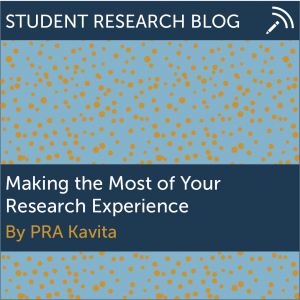 By Kavita Rana, OUR Peer Research Ambassador
By Kavita Rana, OUR Peer Research Ambassador
Research is a long and rigorous process and typically requires patience and determination, but it is also rewarding and helps students gain knowledge in their fields of interest. At the end of the day, your research experience is what you make of it. As you dive into research, I’d like to share a few tips I’ve learned along the way that have helped me make the most of my research experiences and shape my own research career.
Asking Questions
A challenge that I had when I first started doing research was that I wasn’t sure how proactive I should be. I would say the most important thing to do when first starting is to ask questions. Always ask questions when something does not make sense because graduate students and faculty can sometimes forget that undergraduates may not have as deep of a background as they do. Additionally, it’s best to ask questions right away so that you can understand the purpose of the experiments that you’re conducting. If a certain concept doesn’t make sense right away, try rereading the material, looking up other articles, talking with graduate students, and then finally asking a faculty member. Everyone understands that research is meant to be a learning experience, but a huge part of that learning comes from asking questions when concepts aren’t clear.
Working Independently
One thing I’ve noticed many students struggle with is the amount of time it may take to become autonomous. Some fields require immense amounts of training before you can be prepared to complete a project independently. As a result, you might find yourself doing basic level work in the beginning of your research career. Although it can be frustrating, it’s important to know that proper training and lab etiquette are needed to build a strong foundation for the future. If you can get a strong foundation, it will become much easier to work independently on a project.
Balancing Commitments
The biggest challenge I faced while doing research was balancing my time in the lab with other time commitments. I used to do research for 9 hours a week, which can be overwhelming when there are other activities you’re involved in. However, something that my PI (principal investigator) told me was that it was never a good idea to spread myself too thin. She told me to be realistic with my goals and that properly manage my time. As a result, I had to cut down my hours in the lab and do more of the work at home. I had to change my schedule so that I could make time for research at night. It took some adjusting, but I was eventually able to find a schedule that worked.
Kavita is a senior majoring in Molecular & Cell Biology and minoring in Statistics and Psychology. Click here to learn more about Kavita.